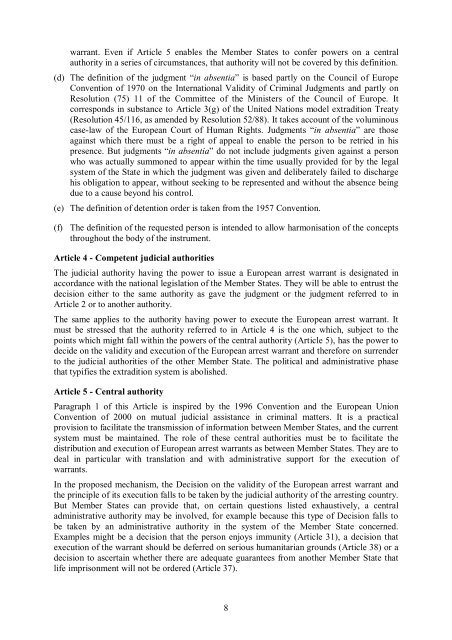the European arrest warrant - Statewatch
the European arrest warrant - Statewatch
the European arrest warrant - Statewatch
Create successful ePaper yourself
Turn your PDF publications into a flip-book with our unique Google optimized e-Paper software.
<strong>warrant</strong>. Even if Article 5 enables <strong>the</strong> Member States to confer powers on a central<br />
authority in a series of circumstances, that authority will not be covered by this definition.<br />
(d) The definition of <strong>the</strong> judgment “in absentia” is based partly on <strong>the</strong> Council of Europe<br />
Convention of 1970 on <strong>the</strong> International Validity of Criminal Judgments and partly on<br />
Resolution (75) 11 of <strong>the</strong> Committee of <strong>the</strong> Ministers of <strong>the</strong> Council of Europe. It<br />
corresponds in substance to Article 3(g) of <strong>the</strong> United Nations model extradition Treaty<br />
(Resolution 45/116, as amended by Resolution 52/88). It takes account of <strong>the</strong> voluminous<br />
case-law of <strong>the</strong> <strong>European</strong> Court of Human Rights. Judgments “in absentia” arethose<br />
against which <strong>the</strong>re must be a right of appeal to enable <strong>the</strong> person to be retried in his<br />
presence. But judgments “in absentia” do not include judgments given against a person<br />
who was actually summoned to appear within <strong>the</strong> time usually provided for by <strong>the</strong> legal<br />
system of <strong>the</strong> State in which <strong>the</strong> judgment was given and deliberately failed to discharge<br />
his obligation to appear, without seeking to be represented and without <strong>the</strong> absence being<br />
due to a cause beyond his control.<br />
(e) The definition of detention order is taken from <strong>the</strong> 1957 Convention.<br />
(f)<br />
The definition of <strong>the</strong> requested person is intended to allow harmonisation of <strong>the</strong> concepts<br />
throughout <strong>the</strong> body of <strong>the</strong> instrument.<br />
Article 4 - Competent judicial authorities<br />
The judicial authority having <strong>the</strong> power to issue a <strong>European</strong> <strong>arrest</strong> <strong>warrant</strong> is designated in<br />
accordance with <strong>the</strong> national legislation of <strong>the</strong> Member States. They will be able to entrust <strong>the</strong><br />
decision ei<strong>the</strong>r to <strong>the</strong> same authority as gave <strong>the</strong> judgment or <strong>the</strong> judgment referred to in<br />
Article 2 or to ano<strong>the</strong>r authority.<br />
The same applies to <strong>the</strong> authority having power to execute <strong>the</strong> <strong>European</strong> <strong>arrest</strong> <strong>warrant</strong>. It<br />
must be stressed that <strong>the</strong> authority referred to in Article 4 is <strong>the</strong> one which, subject to <strong>the</strong><br />
points which might fall within <strong>the</strong> powers of <strong>the</strong> central authority (Article 5), has <strong>the</strong> power to<br />
decide on <strong>the</strong> validity and execution of <strong>the</strong> <strong>European</strong> <strong>arrest</strong> <strong>warrant</strong> and <strong>the</strong>refore on surrender<br />
to <strong>the</strong> judicial authorities of <strong>the</strong> o<strong>the</strong>r Member State. The political and administrative phase<br />
that typifies <strong>the</strong> extradition system is abolished.<br />
Article 5 - Central authority<br />
Paragraph 1 of this Article is inspired by <strong>the</strong> 1996 Convention and <strong>the</strong> <strong>European</strong> Union<br />
Convention of 2000 on mutual judicial assistance in criminal matters. It is a practical<br />
provision to facilitate <strong>the</strong> transmission of information between Member States, and <strong>the</strong> current<br />
system must be maintained. The role of <strong>the</strong>se central authorities must be to facilitate <strong>the</strong><br />
distribution and execution of <strong>European</strong> <strong>arrest</strong> <strong>warrant</strong>s as between Member States. They are to<br />
deal in particular with translation and with administrative support for <strong>the</strong> execution of<br />
<strong>warrant</strong>s.<br />
In <strong>the</strong> proposed mechanism, <strong>the</strong> Decision on <strong>the</strong> validity of <strong>the</strong> <strong>European</strong> <strong>arrest</strong> <strong>warrant</strong> and<br />
<strong>the</strong> principle of its execution falls to be taken by <strong>the</strong> judicial authority of <strong>the</strong> <strong>arrest</strong>ing country.<br />
But Member States can provide that, on certain questions listed exhaustively, a central<br />
administrative authority may be involved, for example because this type of Decision falls to<br />
be taken by an administrative authority in <strong>the</strong> system of <strong>the</strong> Member State concerned.<br />
Examples might be a decision that <strong>the</strong> person enjoys immunity (Article 31), a decision that<br />
execution of <strong>the</strong> <strong>warrant</strong> should be deferred on serious humanitarian grounds (Article 38) or a<br />
decision to ascertain whe<strong>the</strong>r <strong>the</strong>re are adequate guarantees from ano<strong>the</strong>r Member State that<br />
life imprisonment will not be ordered (Article 37).<br />
8
















